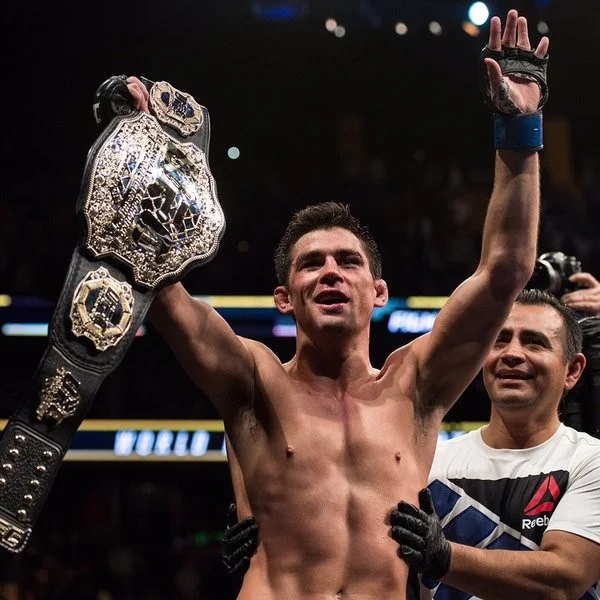Adversity Creates Perspective: Dominick Cruz
The last WEC bantamweight champion and the first ever UFC Bantamweight champion, Dominick Cruz, has been through hell and back (athlete's hell). Name another athlete that has had 3 ACL surgeries and a torn groin, and still come back to their sport and perform at the highest level. If you've been following the lead up to the TJ Dillashaw vs. Dominick Cruz fight, you might have seen several of Cruz's interviews. Hes gone on about how hes changed his mindset after experiencing multiple career-ending injuries: he worked diligently on his rehab, he also decided to improve himself in other areas of the sport, by becoming a fight-analyst for FOX (with perhaps one of the highest fight IQs in the sport, I see Cruz being a great coach).
When discussing the growth and evolution of the sport, many people attribute it to more conditioned/stronger fighters, more accurate strikers, higher level grapplers, and a general increase in the skill ceiling of fighters. Its easy to forget that the mind set of fighters also evolve (at least it needs to). Arousal levels, self-efficacy, and self-doubt all play a role in sports performance. How fighters deal with adversity, and how they react to devastating losses and injuries can make or break his/her next performance. On top of that, MMA is a rather unforgiving sport, getting tapped out or knocked out in front of millions of people can damage one's ego beyond repair. Most fighters think they're prepared for it... until the moment actual comes.
What has the champ Dominick Cruz learned from his injuries and his time off?
The greatest moment in my life was realizing that I didn't need a belt to be happy
- Dominick Cruz, post-fight
The way Dominick acted and his expressions before the split-decision announcement by Bruce Buffer made me believe hes really telling the truth. When you realize everything that comes with success in sport can be taken away from you by an injury, you start to appreciate life more. I'm sure that Cruz's mindset has been very much process-oriented and driven by small improvements in all aspects of his health and fight game. This, paired with his high skill level and ability to read his opponents, in my opinion, makes him one of the best pound for pound fighters in the sport. He's ahead of his time, like how GSP was ahead of his time (incooporating gymnastics training, olympic weightlifting, well-roundedness), like how Anderson Silva was ahead of his time.
I don't care if you scored it 3-2 for TJ or 3-2 for Cruz. What Dominick Cruz did on Sunday night was one of the greatest performances I've ever seen, especially given the circumstances he was in.
So what can we learn from Dominick Cruz?
1. Adversity creates perspective
You see things differently when you're put into positions you're not comfortable in, circumstances you've never been in before. Don't take losses as the end of the road, keep on improving. The best fighters have been created following losses (GSP vs. Matt Serra, Anderson Silva vs. Ryo Chonan, Conor McGregor vs. Joseph Duffy, etc).
2. Mental Toughness
Mental toughness can come from peace of mind. Realize and appreciate the opportunities you are given to train, fight, compete. The journey and the process is more valuable than any successful outcome that is handed to you on a plate.
3. Stay creative
Cruz has been known to take techniques from boxing, specifically from Muhammad Ali, and incorporate them into his repertoire of skills. His movement, footworks and feints are all unseen in the sport. While straying away from the fundamentals and conventional skills can bite you in the ass later down the line, don't be afraid think outside the box and apply things that aren't normally considered or suggested (in your respective sports).
4. Better strength & conditioning practices/protocols
Its not surprising that Cruz's footwork and movement has contributed to his ACL and groin injuries, but theres no doubt in my mind that the severity or frequency of those injuries could have been prevented with better strength & conditioning practices. MMA is still considered a young sport, and we are just now seeing more qualified and thoughtful strength & conditioning coaches working with top level fighters. I wonder what Cruz could have done differently with his strength training or conditioning training to prevent his ACL injuries. More on this in another blog post.
5. Sport psychology moving forward
I'm not too up to date with research on sport psychology, but I believe there will be more advances and more ways to improve mental, and emotional states of mind during training and competition, in order to improve performance. An iron mind might be the key to "unlock" performance potential and minimize the barriers between athletes and their true potential. This may come from improving pre-existing visualization techniques, or improving focus and relaxation pre-competition. Psychology and mindset should also adapt and change relative to an athlete's periodized plan.
6. Don't play the victim role
Stop feeling sorry for yourself, don't be the victim. Pick your ass back up, believe in yourself, set goals, achieve them. Simple is that. No one can help you, but you.
Thanks for reading!
Notable Quotes from Dominick Cruz:
I had to show something to myself, thats what this was... I've seen different guys that move like him, DJ's faster, Benavidez hits hard, Faber as much as I don't like him, hes a tough guy. All these guys built me into who I am right now, and TJ just added to that. Now, I'm at another level
Remember, ring rust is nothing more than mental weakness.

